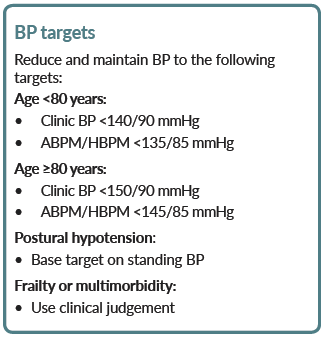Hypertension (target blood pressure in diabetics)
Considered in terms of Type I and Type II diabetics
- note though that the ACCORD blood pressure trial concluded that intensive blood pressure (BP) control to a systolic target of less than 120mmHg, compared with a target of less than 140mmHg, did not significantly reduce the rate of a composite outcome of fatal and non-fatal major cardiovascular (CV) events in patients with type 2 diabetes at high CV risk
- adverse effects were more common in the intensive BP control group
- study adds to the evidence that over-intensification of treatment in type 2 diabetes provides limited or no overall benefit, and may increase the risk of adverse events.
BP targets
- NICE suggest for type 2 diabetics (2):

- NICE suggest target blood pressure levels in people with CKD:
- in people with CKD aim to keep the systolic blood pressure below 140 mmHg (target range 120-139 mmHg) and the diastolic blood pressure below 90 mmHg
- in people with CKD and diabetes, and also in people with an ACR of 70 mg/mmol or more, aim to keep the systolic blood pressure below 130 mmHg (target range 120-129 mmHg) and the diastolic blood pressure below 80 mmHg
- NICE guidance states with respect to type 1 diabetes (3):
- Blood pressure management
- intervention levels for recommending blood pressure management should be 135/85 mmHg unless the adult with type 1 diabetes has albuminuria (an ACR of 70 mg/mmol or more) or 2 or more features of metabolic syndrome, in which case it should be 130/80 mmHg
- start a trial of a renin-angiotensin system blocking drug as first-line therapy for hypertension in adults with type 1 diabetes
- Do not allow concerns over potential side effects to inhibit advising and offering the necessary use of any class of drugs, unless the side effects become symptomatic or otherwise clinically significant. In particular:
- do not avoid selective beta-adrenergic blockers where indicated in adults on insulin
- low-dose thiazides may be combined with beta-blockers
- when calcium channel antagonists are prescribed, use only long-acting preparations
- use direct questioning to detect the potential side effects of erectile dysfunction, lethargy and orthostatic hypotension with different drug classes
- Blood pressure management
Reference:
- The Accord Study Group. Effects of intensive blood-pressure control in type 2 diabetes mellitus. New Engl J Med 2010; published online March 14th (10.1056/NEJMoa1001286)
- NICE. Hypertension in adults: diagnosis and management. NICE guideline NG136. Published August 2019, last updated November 2023
- NICE. Type 1 diabetes in adults: diagnosis and management. NICE guideline NG17. Published August 2015, last updated August 2022
Related pages
Create an account to add page annotations
Annotations allow you to add information to this page that would be handy to have on hand during a consultation. E.g. a website or number. This information will always show when you visit this page.